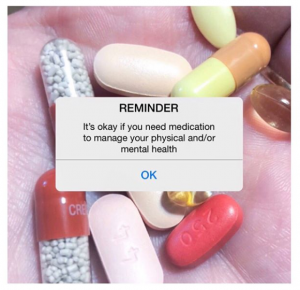I couldn’t read your post or the conversation it caused, Jenny, because I am not on instagram, so I hope I understand your question and point of view well enough. If not, please correct me.
I have never experienced any stigma for medication, cf or otherwise.
For me, medication is like food, drink, air and rest – if the body needs it, the body gets it. I trust my body to be honest and right about its needs. I did not put it there nor do I understand it, but the one who did does, and will take me home again, with our without meds.
There is no judgement involved on my part. Then the battle is half-won already. Or actually, entirely.
Stigma is talked about in the world out there, so in that way even if I don’t entertain it in myself, it has a form of existence in the minds of others who are ignorant and (therefore) judgmental. But as long as I don’t pick that up, nor breed thoughts along this line myself, I am still free of it. What other people think is none of my business – there is no beginning and no end to that once you get involved in it. If I only can look into the mirror to myself every morning with a smile, all is fine. To do this, I only need a clear and peaceful mind (and a shave – or my smile will turn into a giggle). So in this way, what my mind thinks is none of my business either.
And who knows about my medication anyway? Mostly they are the professionals who prescribe them or those who provide. They are unlikely to have any second thoughts about it. Other than that, there may be confidants who know. For this group I can only say: guard your privacy, don’t share everything with just anyone. Chose your (real) friends wisely and, if needed, educate them. If they still don’t get it, forgive them for not knowing what they do or think. If they bother you about your medication use: reconsider if they are worth your friendship, company or attention in the first place.
Let me examine an example. Let’s say I need an anti-depressant for a while because my thoughts have gotten out of control due to unmanaged stress, and the balance in the brain needs some external support to re-establish itself, I might also need some psychotherapy to improve my self-management skills. If I don’t treat this the neutral way I described above, I could get entangled in another set of thoughts about me feeling guilty needing anti-depressants and therapy and not being able to solve this myself. Above that I might start a thought-line that entertains the idea that other people, friends, family, partner, even the doctor or pharmacist, might think I am a loser to need the medication and therapy, or even for imagining myself needing them. I would need an extra pill to counter this (perceived or real) stigmatization. Or it might keep me hooked on the meds and the therapy unnecessarily, because I get caught up in another vicious circle that already involves the pills and the therapy, so I will need even something else to get out of it.
This could all be summarized as entertaining (self)stigmatization. It’s a sort of negative double-bind. I am required to take the medication in order to get well asap and be a well-behaved member of society again, but I should or could also be ashamed of requiring the meds and letting myself wander in such a situation (that mostly was induced by society in the first place). This is a common way of setting up people to impossible tasks. We have all been subjected to various sneaky forms of this, for instance as a kid we got the message that we should love our parents, but this love is only accepted if we do it out of our free will.
Which reminds me of the little joke of the man coming home from work and finding a note on the kitchen table from his wife, reading “Honey, would you please put out the garbage tonight voluntarily?”
This shows we get into weird situations when we entertain thought-lines like these ourselves or suppose they are present with others and react to that. The good news of course is that, since it is all in the mind, controlling the mind will prevent us to fall victim to it. Controlling the mind by the way is not a doing, but a not-doing: mostly it is seeing through and ignoring the thoughts that involve “I, me, or my”. These are wrong or unnecessary most of the time anyway, so you will gain much more than you lose if you ignore them. Ignoring means: don’t believe them and don’t act on them. If you truly believe this and ignore the mind consistently for any serious length of time (call it meditation or mindfulness if you want), it will get the message, calm down and retreat, creating a sense of love, freedom and peaceful being.
Getting rid of stigma starts with yourself. It also ends there.
 I posted this on Instagram yesterday and the conversation that followed was incredibly insightful. [/caption]
I posted this on Instagram yesterday and the conversation that followed was incredibly insightful. [/caption]